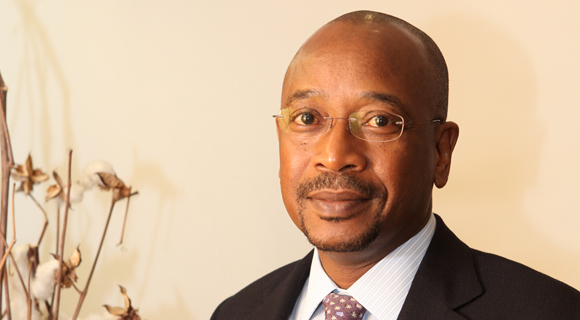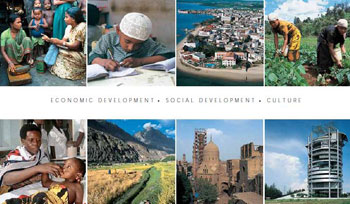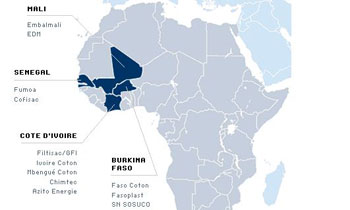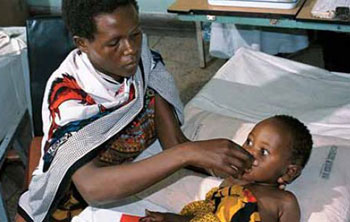Supporting The Development Of Côte d’Ivoire
Mahamadou Sylla, Deputy Chief Executive Officer of IPS WA (Industrial Promotion Services West Africa)
IPS WA focuses on the development of industry and infrastructure to boost the economic and business development of Côte d’Ivoire and of other countries of West Africa in which the company operates.
Interview with Mahamadou Sylla, Deputy Chief Executive Officer of IPS WA (Industrial Promotion Services West Africa)

The situation hasn’t been easy recently, but the economy is slowly getting back on track after the post-electoral crisis. What challenges is Côte d’Ivoire currently facing?
The main challenge facing the government right now is safety. In any country after a civil war, there are a lot of weapons in circulation that are in both good and bad hands. Hence security issues arise. Solving this problem is the government’s priority. Additionally, investment has been very low in the last 10 years, and the existing infrastructure has deteriorated completely. But this fact can be viewed as an advantage since it creates a lot of business opportunities for companies to rebuild the infrastructure and contribute to the economy.

What is your advice to investors who have not been previously exposed to the Ivorian market if they now see an opportunity in the change of government and in the spirit of the country?
It’s quite simple: Côte d’Ivoire will grow and national growth in the coming years will be phenomenal. One needs to understand that in West Africa, there are two economic unions: UEMOA and ECOWAS. ECOWAS is a free trade zone that represents 200 million consumers (it is not restricted to Côte d’Ivoire). Why select the Côte d’Ivoire for investment? Because Côte d’Ivoire is the most advanced country in the region in terms of infrastructure (power, roads, and communication).
The strategy is to set up the company in Côte d’Ivoire and then explore the surrounding markets. The company will grow along with the economy in the sub-region since they are both dependent on the country. Thus, now is the right time to take action. Investors should come quickly.
What regulations would help industrial development if implemented in Côte d’Ivoire? Do you expect the government to make such a move?
When someone plans on investing, he selects the country based on competitiveness in terms of taxes, infrastructure, working force, etc. Governments have a responsibility to ensure that all of these pre-requisites are met for investors to choose their country. In every conversation Côte d’Ivoire has with the authorities, the country insists on this aspect. That’s the only way to really attract investors.
What other details are available about IPS West Africa? What is IPS WA’s role in the economic development of Côte d’Ivoire?
IPS WA is part of the Aga Khan Fund for Economic Development. Our role is to promote industry in West Africa. IPS WA operates in Côte d’Ivoire, Burkina Faso, Mali, and Senegal and invests in industry and agro-industry. IPS West Africa currently operates in the region’s packaging business, as well as the agro industry (cotton and sugar) and power generation, where we are collaborating with a specialized partner in that field.

IPS West Africa operates a 300-megawatt power plant in Abidjan, which we are hoping to expand to 450-megawatt. IPS WA is in the cotton business – we help cultivators with seeds, fertilizers, training, and development. Eventually IPS WA buys cotton and exports the fiber. We are present in the cotton market in both Burkina Faso and Côte d’Ivoire, in which IPS WA represents 50% of the market. IPS WA runs a 4000 hectares sugar plantation as well as a sugar mill in Burkina Faso.
What makes IPS WA different from other companies?
As any other business, IPS WA needs to be profitable in order to build sustainability. At the same time, we are responsible for the individuals with whom we do business cotton cultivators, villagers around the sugar plantation, etc.) by building health facilities, schools, etc. This is a constraint that IPS WA faces in addition to our business-related responsibilities. All of IPS West Africa’s investments are subject to rigid criteria. These criteria put emphasis not only on maximizing profits but also on maximizing social development and social benefits.
What are the details concerning IPS West Africa’s business strategy and what makes it unique? Also, how do you select investment opportunities? Do investors approach IPS WA directly?
It’s quite simple: this country is to grow, and national growth in the coming years will be phenomenal.
IPS West Africa looks for opportunities. Our strategy for business development is the same as anybody else’s strategy – before engaging in something, we study sustainability and profitability. There is one more factor we look at before presenting a case to our head office: contribution to development. Is it labor intensive? Does it help the development of the surrounding populations and the country? These are aspects IPS WA analyzes on top of the financial criteria.
Does IPS WA grow organically or by acquisition?
IPS WA grows both organically and by acquisition. In the 1960’s, IPS West Africa created companies from scratch. In the 1990’s, West Africa went through a lot of privatization. The cotton business and the sugar business all came from former government-owned companies. Today IPS WA grows both organically and through acquisition or new ventures.
What opportunities does IPS West Africa see in the market?
Here is an example of the opportunities IPS WA sees in the market. Today, IPS West Africa is looking at different activities; one of these activities is the processing of cashew nuts. Cotton cultivators in the north also produce cashew nuts as a side business. Since the selling price of raw cashew nuts is so low, we decided to help cultivators increase that price by processing and exporting it ourselves. IPS WA will help cultivators in the north generate more revenue. Côte d’Ivoire produces 400,000 tons of raw cashew nuts a year and only about 10,000 tons are processed locally. IPS WA wants to produce more at a local level and support the northern cultivators.
IPS West Africa is also present in the electricity generation…
IPS West Africa just signed an agreement with the government yesterday. We like this project because it is eco-friendly. We currently operate 2 turbines that produce 300-megawatts. The combined cycle plant that IPS WA plans to assemble will use the gas produced by the 2 turbines to generate more power through a steam turbine rather than using the gas released in the air. This project will increase energy production by 50% without using any additional gas.
For this big project, IPS WA will need international partnerships and the best practices. How will you proceed? This also applies to any future project, perhaps in the cashew nuts market.
For any new business IPS WA engages in, it resorts to experts. When we started in the cotton industry, we did it with one of the top 5 cotton traders in the world. That’s how IPS WA learned how the system works. The same goes for energy projects – IPS WA didn’t know anything about energy, so we brought in technical experts.

What is IPS WA’s aim for the next 3 years in terms of return on investment?
Most of the investments are profitable and IPS WA needs to maintain this profit. In terms of growth, the internal plan is to double the size of the business in 5 years. It sounds optimistic, but if annual growth reaches 15%, then in 5 years, the business has doubled in size. In this part of the world, especially in Côte d’Ivoire where the economy has been decreasing for ten years, simply going back to a normal level involves a lot of growth. We are very excited about that idea.
What are the main challenges?
It’s difficult to pinpoint the main challenges. Industrial Promotion Services West Africa has been around for 40 years. IPS WA has developed an expertise to manage locally. This environment is very different from first world markets. The key challenge today is sticking to ethos and governance rules, even within environments where it is extremely difficult to run a business without indulging in certain practices. But the situation is improving. This is something that really makes us stand out.
When it comes to external factors, globalization is one big issue for African countries. Open market is fair, but it’s only fair when everybody abides by the rules. For example, when people import from China without paying taxes, then it’s very difficult to compete with them. Furthermore, IPS WA is active in the cotton and sugar business, and both products are heavily subsidized around the world.
Cotton in the US and sugar in Europe. Somewhat in Brazil as well, because sugar canes in Brazil are grown mainly to produce ethanol, not sugar. Sugar then becomes a sub-product and can be sold very cheap. The problem here is that the governments don’t have enough resources to subsidize anything. This issue is the main difficulty that IPS faces; it pushes us to become more and more creative and efficient.
Lastly, what is AKDN’s role in the world?
AKDN is the Aga Khan Development Network. It has three main objectives. 1. Social development around the world (health centers, schools, etc.). 2. Culture (architecture, etc.). 3. Economic development (Aga Khan Fund for Economic Development), where IPS belongs. The AKFED has three main bodies as well. 1. Financial services (Habib bank, jubilee insurance in central Asia and East Africa). 2. Tourism (through the Serena Hotels network in East Africa and Central Asia). 3. Industrial development with IPS. His Highness The Aga Khan firmly believes that development has three fundamentals: economic, social, and cultural pillars. All three elements have to work together to achieve a balanced development.
What does IPS WA expect in the 5 years to come?
The goal is clear: IPS West Africa wants to double the size of its business in 5 years by expanding further into agro-industry, infrastructure, and energy. We believe that these sectors are the ones that will help countries develop in a sustainable manner by using local resources. Governments don’t always have sufficient resources to develop all these sectors themselves. Developing partnerships with the private sector and companies like IPS are the best solutions to save time and develop quickly.